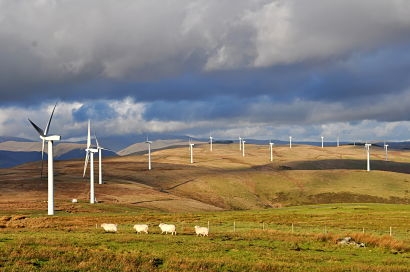
The Welsh renewable energy consultancy Dulas recently achieved an industry-leading 83 percent planning consent success rating despite constrained policy environment around onshore renewables The consultancy has secured its 100th planning permission for renewable energy projects, but despite this milestone achievement, which sees Dulas having added over 520 megawatts of clean energy to the UK and Ireland’s power supplies, the business has warned that regulatory and policy reform for onshore renewables is critical to meeting net zero emissions by 2050.
Government figures illustrate that, under the current planning and regulatory regime, councils reject over a third of wind projects and a quarter of solar projects. In particular, development of onshore wind energy in England remains severely limited by policy that dictates developments must be located in areas identified in local plans and demonstrate unanimous community support.
“The increase in renewable energy capacity necessary to meet our emissions targets is eyewatering” said Michael Phillips, Principal Consultant at Dulas. “The climate crisis is presenting us with a need for absolute commitment to delivering substantial capacity through renewable energy projects, and much of the UK’s planning system is failing to support this commitment. Planning authorities are a critical element of the fight against global warming and it is in the public’s interest to relax regulations on renewables. The government must instruct planning authorities to prioritise a very low carbon agenda and take positive action towards supporting this – from supporting projects based on the positive recommendations of planning officers, allowing lifetime extensions to existing projects, and delivering immediate improved spatial guidance for suitable sites for solar and wind.”
Dulas’ 83 percent planning consent rating follows over 35-years’ in the renewable energy sector, with the business having designed, consulted on, and installed some of the UK’s first renewables projects. These projects include large-scale wind farms, utility-scale solar farms and hydro-electric schemes through to community energy projects, landowner and domestic schemes. The firm’s significant involvement in the early days of the industry has informed an emphasis on early-stage participation in projects, with the company advancing capabilities across site origination, design, and environmental planning, alongside surveying.
“The current policy environment around renewables highlights that planning success isn’t just about choosing the right technology and ticking the right boxes - success rides on trusted relationships with local stakeholders” added Phillips. “Achieving this planning milestone and maintaining such a strong consent rating is testament to the solid and long-term relationships we have built with planners and local authorities across the country. Whilst this is certainly validation of the fantastic work of our team, more needs to be done to support the industry as a whole.”
For additional information:

